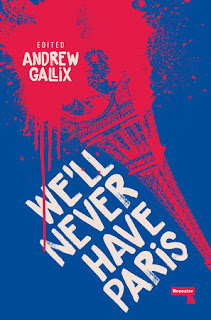I don't want to quibble over a back cover blurb designed to big-up the seventy-nine authors contained in the five-hundred and eighty-three pages of this book, edited by Andrew Gallix, but if they all deserve to be named among the 'most talented and adventurous writers' in the English-speaking word today then je suis l'oncle d'un singe.
However, once you remove from the menu of this moveable feast some of the more bland offerings and half-baked items, then you're left with many things to savour [1] and it's unfortunate that what could have been an excellent slim little book has become (in places) bloated and boring.
The minimalist maxim, less is more, should always determine a project of this kind and every editor should keep a working model of a guillotine on their desk, because, to paraphrase Robespierre, editing is nothing but a form of prompt, severe, inflexible justice; it is therefore an emanation of virtue.
I suppose, like General de Gaulle in his helicopter, one of the things I was looking for was a greater level of cohesion. There were too many times when reading this book that I felt like saying: Gallix, remettez-moi un peu d'ordre dans ce bordel! [2] The idea that a chaos of writers and ideas will automatically result in a work of great beauty (or even great interest) is, sadly, mistaken.
I also couldn't help feeling that Lee Rourke reveals something crucial with the title of his piece. For this book is ultimately a jigsaw picture of a Paris already imagined, rather than an exciting new vision [3].
Thus it is, that all the usual suspects - as well as all the usual street names, monuments and myths - appear in this book over and over again, until even the most ardent francophile begins to roll their eyes and look for a way to exit the twentieth century, so that they might concern themselves only with those moments when life shatters the glaciation of literary nostalgia and allows us to enter a Paris to come ... [4]
Notes
[1] For the record, the pieces I admired most in We'll Never Have Paris are:
Paris at 24 Frames a Second, by Richard Kovitch, pp. 182-190.
The Past is a Foreign City, by David Collard, pp. 191-196.
Waiting for Godard, by Jeremy Allen, pp. 197-203.
City Not Paris, by Anna Aslanyan, pp. 276-282.
Manna in Mid-Wilderness, by Natalie Ferris, pp. 283-288.
Waiting for Nothing to Happen, by Andrew Gallix, pp. 294-299.
Donut, by Will Ashon, 300-302.
The Arraignment of Paris, by Stuart Walton, 332-336.
Paris Perdu, by Tom McCarthy, pp. 342-344.
Ten Fragments of an Idea of Paris Already Imagined by You, by Lee Rourke, pp. 350-356.
Terminus Nord, by Adam Roberts, pp. 367-377.
Poisson Soluble, by Lauren Elkin, pp. 378-387.
Paris, Isidore Isou, and Me, by Andrew Hussey, pp. 448- 454.
Anchovies - Brian Dillon, pp. 538-543.
I suppose I should also mention Flogging a Dead Clothes Horse, by Thom Cuell, pp. 255-263, which discusses the influence of Paris on Malcolm McLaren's political and artistic imagination, though, again, it simply rehearsed a lot of the same old ideas.
[2] I'm grateful to Richard Kovitch who writes of de Gaulle's lament whilst flying high above Paris; see Paris at 24 Frames a Second, We'll Never Have Paris, p. 184.
[3] Lee Rourke, Ten Fragments of an Idea of Paris Already Imagined by You, We'll Never Have Paris, pp. 350-356.
[4] I'm paraphrasing from Leaving the 20th Century, (Free Fall Publications, 1974), a collection of Situationist writings ed. and translated by Chris Gray.
